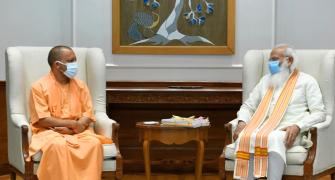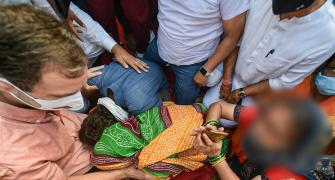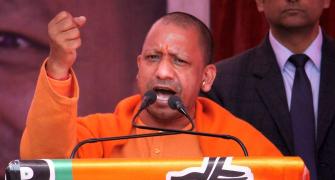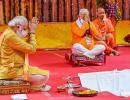The outcome in UP is far more significant than in the other states going to the polls next year.
An unlikely setback in UP can cramp the Modi government, virtually making it a lame-duck two years ahead of the 2024 parliamentary poll, observes Virendra Kapoor.
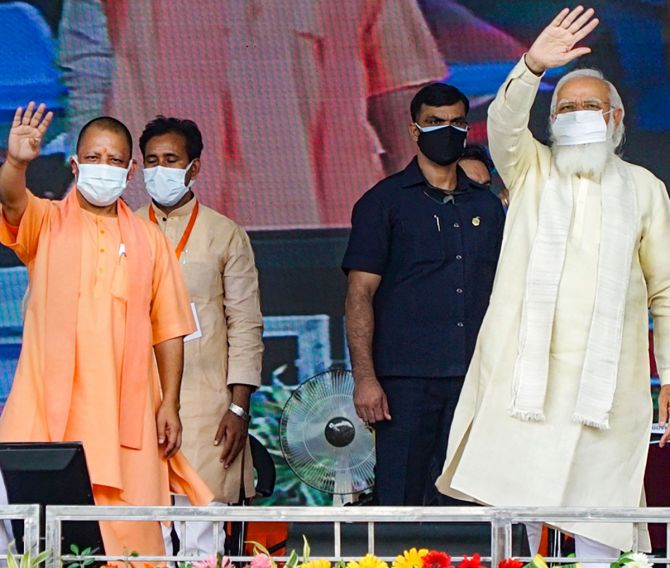
Even as the Opposition showed tentative signs of coordinated effort in Parliament to pin down the government over the latest disclosures in the Spygate II, the real test of its ability to sink differences and present a united front against the Bharatiya Janata party would come in Uttar Pradesh.
Six months from now when the ruling BJP under Chief Minister Yogi Adityanath seeks a fresh mandate, the crucial factor would be Opposition unity -- or lack of it.
Whether the two main regional players, Akhilesh Yadav and Mayawati, will set aside differences, and sidestep bloated egos, to together challenge a common enemy, remains to be seen.
The past example of such a Bahujan Samaj Party-Samajwadi Party concert is not encouraging, given the traditional contradictions between the core supporters of the two parties at the ground level.
Neither can the SP and the BSP afford not to rope in other caste groups which in recent times have broken free from the dominance of the two main caste-based formations in an endeavour to press for a bigger share in power for their own sub-castes.
The Rajbhars, Kashyaps, Nishads, Kurmis, Mauryas, etc., now insist on getting their own pound of flesh when major national and regional parties knock at their door for support.
The BJP, quite oblivious to its past commitment to establish a caste-free society, has gone out of the way to stitch together an all-embracing coalition of various castes and sub-castes under the saffron umbrella.
Identity politics has fragmented society, turning it into separate caste silos at the village level.
Being a national party with a greater chance of success than the competing regional outfits, the BJP is able to attract leaders of various sub-castes and communities better than most.
It is noteworthy that the recent expansion of the Modi ministry was officially touted for the inclusion of a record number of OBCs and lower castes, especially from poll-bound UP.
Along with the inclusion of a number of women, the ministry-making exercise was correctly interpreted as a bid to woo the caste-conscious UP voter.
Admittedly, the outcome in UP is far more significant than in the other states going to the polls next year.
An unlikely setback in UP can cramp the Modi government, virtually making it a lame-duck two years ahead of the 2024 parliamentary poll.
Having tasted blood in UP, the Opposition will feel encouraged to create hurdles in Modi's way.
On the other hand, a BJP win will lift the saffron Parivar's sagging spirits which of late has been on the back foot due to the alleged mishandling of the pandemic, the noise over the Pegasus case, the loss of employment opportunities in the informal sector, and a slowing economic growth.
Above all, retaining UP will do wonders in confidently propelling the BJP to implement its agenda with an eye on the 2024 Lok Sabha election.
While the SP and BSP are engaged in rehashing the old strategy of wooing the Brahmins -- who constitute about 12 percent of the electorate but wield far more influence disproportionate to their numbers -- the effort may not bear fruit.
Organising the so-called Brahmin Sammelan, the two outfits seek to exploit the alleged resentment of the community against the Thakur-Rajput-dominated Yogi government.
They ignore the fact that a record number of 57 BJP MLAs in the current assembly are Brahmins.
The upper castes voted en bloc for the saffron party in 2017.
Besides, Brahmins have traditionally been at the receiving end of Yadav intimidation and bullying in UP villages.
Between Yadavs and Rajputs, who apparently are the dominant caste now because the CM is a fellow Rajput, it is the latter who have invariably come to the rescue of Brahmins whenever they have found themselves attacked by the former.
The Opposition charge that the Brahmins are feeling suffocated is exaggerated.
It is claimed the scrapping of the public holiday on Parshuram Jayanti has angered the Brahmins. hat the entire community can turn against the ruling party due to the decision to reduce the number of public holidays does not stand to reason.
Brahmins have always felt at home under a Congress or a BJP dispensation rather than in SP/BSP regimes.
Yes, the Congress would have been an alternative, but given its woeful state even its most ardent admirers tend to gravitate towards the BJP rather than squander their vote on the SP or BSP.
Otherwise too, the Brahmins were always inclined to vote for the hitherto upper caste-dominated BJP.
Before the BJP got into the pole position, Brahmins along with the Dalits and Muslims constituted the core base of the Congress party.
The decline and fall of the Congress meant that the Jatav-Dalits went to the BSP while Brahmins shifted virtually en masse to the BJP, especially after it took up the cause of the Ram Mandir.
Leaving aside such caste-specific targeting by political parties with an eye on the assembly poll, the fact is the Yogi government has opened its purse strings six months ahead of the election to bestow largesse on the most backward sections.
The programme to distribute five kilograms of free food grains per month to every adult in poor households, coupled with the provision of a greater number of LPG cylinders and the on-going cash transfer of Rs 2,000 every quarter to small farmers are potentially poll winners.
On top of these welfare measures is the allotment of free dwelling units under the PM Gramin Awaas Yojana.
Caste and community affiliations further fortified by the appeal of freebies can neutralise whatever anti-incumbency there may be against the Yogi government.
In sum, the BJP's catch-all social alliance augmented fully by the distribution of goodies to the poor would ensure that it remains a strong contender to retain power.
An inordinately high significance was attached to Mamata Banerjee's victory in West Bengal, while it is undeniable that the actual winner was the BJP insofar as it had improved its seat tally from three to 77 in the state assembly and its vote percentage rose from below ten to nearly forty percent.
Driven by the same one-sided narrative, the coming UP assembly poll is sought to be foregrounded by anti-Yogi propaganda by thostile sections of the media.
It may be early days yet, but we assert that Yogi is in a good place to win a fresh mandate.
Feature Presentation: Aslam Hunani/Rediff.com

